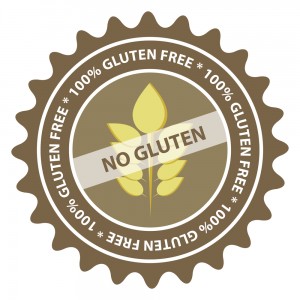 “Gluten-free” products are becoming more and more popular. In fact, it’s a growing business. You’ve probably noticed gluten-free choices at grocery stores and restaurants. Celebrities like Lady Gaga have switched to a gluten-free diet. A few years ago, Chelsea Clinton made headlines for serving a gluten-free cake at her wedding.
“Gluten-free” products are becoming more and more popular. In fact, it’s a growing business. You’ve probably noticed gluten-free choices at grocery stores and restaurants. Celebrities like Lady Gaga have switched to a gluten-free diet. A few years ago, Chelsea Clinton made headlines for serving a gluten-free cake at her wedding.
As general awareness of gluten continues to rise, it’s important to have a basic understanding of what gluten is, and the difference between gluten intolerance – also called gluten sensitivity – and celiac disease.
What is Gluten?
Gluten is a protein composite found in grains like wheat, barley and rye. Gluten gives dough its elasticity, helps it rise, and gives it a chewy texture. Picture the pizza dough being twirled in the air. Gluten helps to make that happen.
Cases of gluten intolerance and celiac disease have risen sharply during the last 10 years. Experts estimate that about 1% of Americans have celiac disease, although most cases go undiagnosed.
Celiac Disease
Celiac disease is an immune response – or a severe and sudden allergic reaction – to gluten. Because it can prevent important nutrients from being absorbed, it can cause malnutrition and damage the lining of the small intestine. Symptoms include stomach pain, diarrhea, constipation, fatigue, anemia, bone pain and severe skin rashes.
For people with celiac disease, a gluten-free diet is essential. “Gluten-free” means avoiding any food with gluten. It also means avoiding cross-contamination by making sure food preparation instruments and utensils are only used on gluten-free products. For example, a spoon used to prepare food with gluten can’t be used in gluten-free food preparation.
Gluten Intolerance
Gluten intolerance, on the other hand, has a slower onset and a broader range of symptoms that are less severe, which can make it difficult to diagnose. In the case of gluten intolerance, the lining of the small intestine is not attacked as it is with celiac disease. Unlike celiac disease, the inflammation typically goes away when gluten is removed from the body.
The most common symptoms of gluten intolerance are bloating, abdominal discomfort and diarrhea. Headaches, lethargy, attention-deficit disorder, hyperactivity, muscle weakness and joint paint may occur as well.
What can you do?
When undiagnosed, celiac disease and gluten intolerance have been known to contribute to diabetes, bowel cancer, anemia and osteoporosis. Some evidence indicates that stress can cause the symptoms to worsen.
Symptoms for celiac disease and gluten intolerance can be similar to other diseases, like Crohn’s disease, irritable bowel syndrome and chronic fatigue. That’s why it’s important to come see us at Natural Healthcare Center, where we specialize in recognizing conditions like these that are often overlooked or undiagnosed.
Pain and discomfort should not be accepted as normal, or just a part of life. This is our body’s way of telling us that something isn’t quite right. This is the year of the family, so listen to what your body is saying, see your doctor, and take your health back.
Are you or someone you know dealing with celiac disease or gluten intolerance? What kinds of gluten-free foods do you enjoy? We’d love for you to share them with us on Facebook.
Dr. James Proodian is an accomplished chiropractic physician and health educator who founded Proodian Healthcare Family of Companies to help people feel better, function better, and live longer. His expertise for the past two decades has been in physical rehabilitation, and he has successfully established himself as a spinal specialist. In his practice, he advocates the science of functional medicine, which takes an integrative approach to treating patients by addressing their physical, nutritional, and psychological needs. Alarmed by the escalation of complex, chronic illness in our country, Dr. Proodian has been speaking to companies and organizations through his “Wellness at Work” program since 1994, motivating thousands of people to make positive lifestyle choices and lead healthier, more productive lives. He can be heard weekly on his radio program, “Proodian Healthcare By Design,” on Tandem Radio.